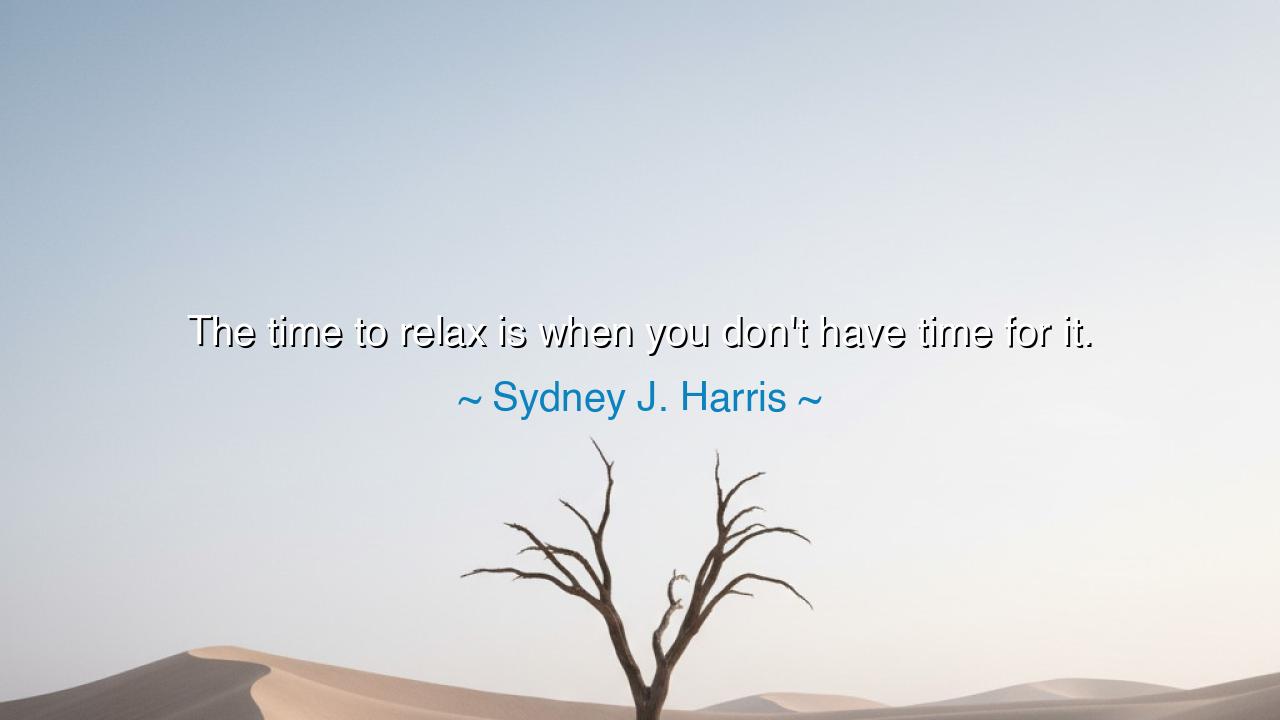
The time to relax is when you don't have time for it.






Sydney J. Harris, in his simple yet thunderous wisdom, declared: “The time to relax is when you don’t have time for it.” At first glance, these words appear like a paradox, a riddle meant to confuse the hasty mind. Yet within them lies a profound truth, one carved from the marrow of human struggle. For it is in the very hour when the burden of life weighs heaviest, when duties clamor and storms rage, that the soul most desperately thirsts for rest. To deny it then is to break the vessel; to honor it then is to preserve the flame.
The ancients knew this secret well. They spoke of balance, of the harmony between toil and stillness. The farmer who labors without pause soon finds his plow dull, his back bent, and his spirit broken. The warrior who never lays down his sword will one day discover that his hand trembles too much to lift it. And so Harris reminds us that rest is not a luxury, but a weapon, not an escape, but a source of strength. When time seems most scarce, when urgency grips us like iron chains, that is when rest is most vital—for it sharpens the edge, clears the vision, and renews the courage to endure.
History offers us countless witnesses. Consider Winston Churchill during the Second World War. Surrounded by fire and ruin, pressed by armies and the endless weight of decisions, he astonished those around him with his practice of napping in the midst of crisis. While others thought it madness, he declared that these intervals of rest doubled his working power. He knew the secret Harris speaks of: that when one is busiest, rest becomes not optional, but essential. It was in the quiet of those stolen hours that he found the strength to rally a nation with words that still thunder across the ages.
And yet, how often do we fall into the trap of believing the opposite? We say to ourselves, “I will rest when the work is done, when the battle is over, when the storm has passed.” But the storms of life are endless, and the work of man is never complete. To wait for a perfect moment of peace is to wait for eternity. Harris’s words strike us like a bell: the perfect time is not later, but now, especially when the world seems least willing to grant it.
This teaching is not about laziness, nor is it an excuse for neglect. Rather, it is about wisdom, about knowing the seasons of the heart. Just as the earth must lie fallow to bring forth a stronger harvest, so too must the soul step back in order to step forward with greater strength. To ignore this law is to invite collapse. To honor it is to achieve endurance that outlasts even the most relentless demands.
Therefore, my children, take this lesson to heart: when your mind is crowded, when your calendar groans, when your breath shortens and your chest tightens—pause. Lay aside the tools of labor, if only for a brief moment, and drink from the still waters of rest. Even a few moments of silence can rekindle the fire that busyness seeks to extinguish. In stillness you will find clarity; in calm you will rediscover your power.
The practical way is simple yet mighty: breathe deeply when chaos rises; walk slowly when others run; close your eyes and let the heart beat steady, even as the world shouts for your attention. Do not think of these acts as wasted time, but as the hidden forge where your spirit is tempered. In the very moment you believe you cannot pause, pause all the more—this is the paradox that preserves life.
So remember Harris’s words: “The time to relax is when you don’t have time for it.” Let them echo in your mind like a guiding star. For those who master this truth will not be swept away by the flood of duties, but will stand firm, refreshed, and unshakable—able to endure not just the tasks of today, but the great trials of all tomorrows.






AAdministratorAdministrator
Welcome, honored guests. Please leave a comment, we will respond soon